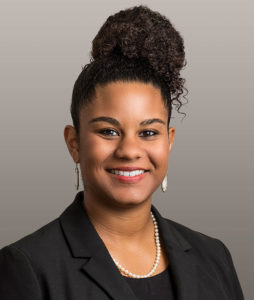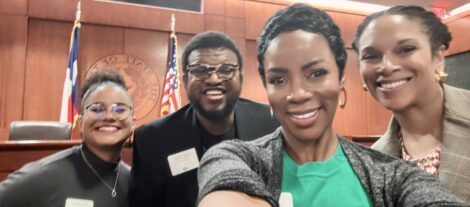 By Paige Duggins-Clay, J.D. • February 27, 2024 •
By Paige Duggins-Clay, J.D. • February 27, 2024 •
I was proud to participate in the Thurgood Marshall Legal Society’s symposium, Afrofuturism and the Law, recently hosted at the University of Texas School of Law. As IDRA’s chief legal analyst, I presented on a panel discussing the state of education, and how Afrofuturism inspires innovative and transformative legal, policy, and advocacy strategies for achieving inclusive education.
I was joined on the panel by Andrew Hairston, director of the Education Justice Project at Texas Appleseed, and Demetria Frank, University of Memphis associate dean for diversity and inclusion.
According to one expert, “Afrofuturism is a literary and cultural movement that reimagines African American history through the lens of science fiction and fantasy.” Afrofuturist scholar Alondra Nelson has similarly described Afrofuturism as “a way of covering discussions about race, identity, alienation and the aspirations of the Black community in a utopic future.”
 The symposium was grounded in the scholarship of law professor Bennett Capers, who authored an article titled, Afrofuturism, Critical Race Theory, and Policing in the Year 2044, in 2019, shortly after he watched the film Black Panther.
The symposium was grounded in the scholarship of law professor Bennett Capers, who authored an article titled, Afrofuturism, Critical Race Theory, and Policing in the Year 2044, in 2019, shortly after he watched the film Black Panther.
In the article, Professor Capers explores the question, “What might the future look like in year 2044, when people of color make up the majority in terms of numbers, or in the ensuing years, when they also wield the majority of political and economic power?”
Applying that concept to education law offers a welcome opportunity to re-think current strategies for envisioning and manifesting equal educational opportunity for Black students, and for all historically marginalized students and communities. Below are my key takeaways from reflecting on Afrofuturism, education and the law.
Black students, families and educators belong in our schools
Afrofuturism challenges the mainstream assumption that Black people are “alien” or “other” in our communities and schools. Instead, Afrofuturism affirms that Black students, families and educators belong in our schools as valued community members and leaders.
The United States has a long history of operating under laws and policies legally barring and even criminalizing Black students from accessing education, followed by decades of legally-sanctioned school segregation, and followed again by chronic and systemically underfunding public schools serving Black and other minoritized communities.
Using an Afrofuturist lens, we can imagine and ultimately manifest safe and supportive schools where Black students and the adults who support them belong and thrive.
For example, an Afrofuturist school would ensure Black people’s belonging …
- Being free from school-based police and other unnecessary, harmful surveillance measures, that can foster hostile environments for Black and other marginalized students and increase contact with the criminal justice system;
- Eliminating zero tolerance discipline practices that have disproportionately pushed Black students into exclusionary and alternative education and the school-to-prison pipeline;
- Investing in the implementation of evidence-based practices, such as restorative justice (which has African/indigenous roots) to support students, families, and educators, address misbehavior and address harm when it occurs;
- Developing authentic relationships with Black families, who should be centered in decision-making about their child’s education and considered trusted partners and school leaders; and
- Prioritizing recruitment and retention of Black educators, who were systemically pushed out of the education workforce following the Supreme Court’s decision in Brown v. Board of Education and who continue to face barriers to accessing and thriving in the education profession.
Black students should not have to leave their identities, cultures or histories at the door
To create a racially just future for Black students, we must understand and protect Black history, identity and culture.
Unfortunately, students and educators in the United States are living through an unprecedented era of censorship in public schools, which has resulted in thousands of books being removed from school and classroom libraries – 37% of which include characters of color or discuss race and racism.
These efforts have also weakened quality school curriculum, lowered student and educator morale, and destabilized safe and supportive school climates.
Even more disturbing, Black students continue to be punished, bullied and harassed for existing and expressing their cultural identities. According to the most recent hate crime statistics released by the FBI, Black people are three times more likely to experience bias-based incidents than the next highest racial/ethnic group, and schools are the third most common location for hate crimes.
An Afrofuturist education would ensure that Black students are not punished or harmed for expressing and celebrating their authentic and excellent selves by…
- Protecting Black students’ right to imagine, dream and reflect through accurate, inclusive curriculum and culturally sustaining pedagogy;
- Preventing and effectively addressing racial and other identity-based bullying and harassment in schools;
- Adopting African American Studies and ethnic studies courses that promote deep and rich exploration of Black students’ histories, cultures and futures; and
- Ensuring school and classroom libraries are filled with diverse and inclusive characters, authors, perspectives and issues, including books by Black and Afrofuturist authors, such as Octavia Butler, Toni Morrison, Alice Walker, Ibram X. Kendi, Zora Neal Hurston, James Baldwin, Maya Angelou and many others.
Despite efforts to demoralize our school communities and desensitize us to efforts undermining racially just education, Robin Kelley reminds us, “Without new visions, we don’t know what to build, only what to knock down. We not only end up confused, rudderless, and cynical, but we forget that making a revolution is not a series of clever maneuvers and tactics, but a process that can and must transform us.”
Reflecting on Afrofuturism, education and the law demonstrates that our freedom dreams are not fantasy, but well-within our grasp.
To learn more about IDRA’s vision for supporting Black students, review our robust policy agenda on this topic.


